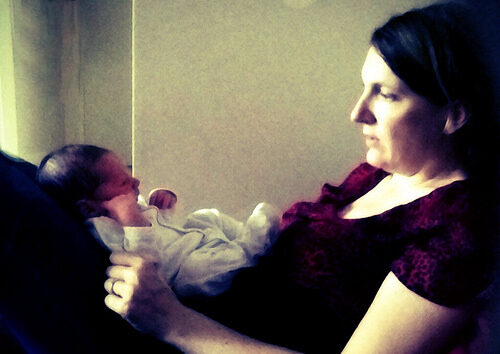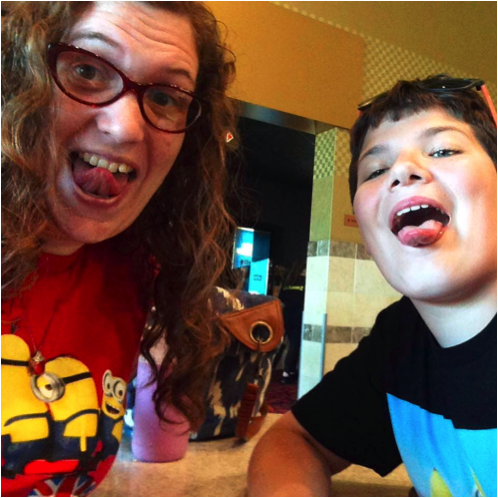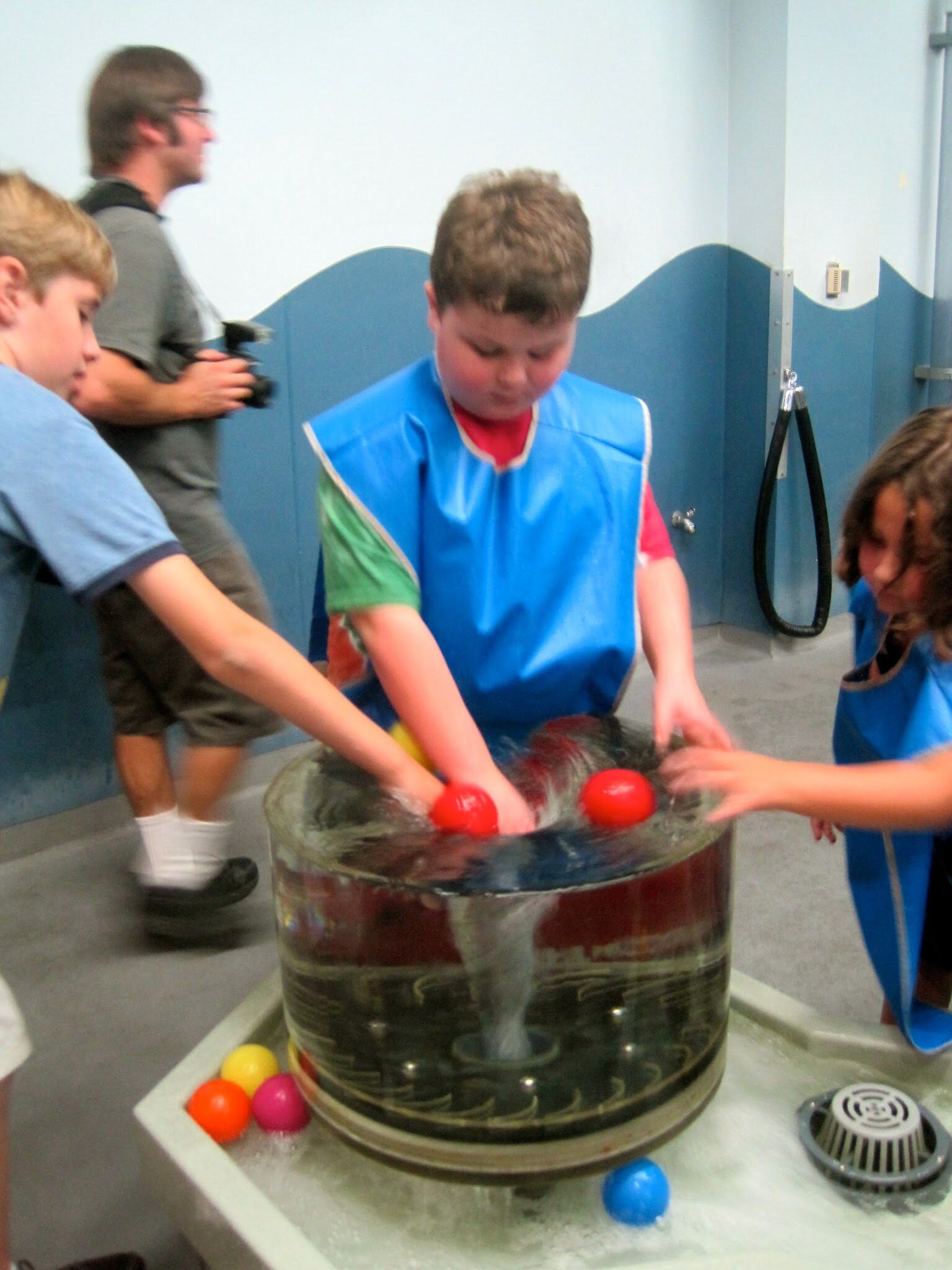Photo © Georgie Sharp. Creative Commons License. [image: Reclining white mother with dark hair, seen from the side, looking at an infant lying on her lap.] TPGA is observing Autism Acceptance Month by featuring accounts from autistic people about the differences accommodations (or lack thereof) make in their lives. Today’s story is from Autisticmotherland, on what professionals need to know about supporting — and diagnosing — autistic parents of autistic children. Autisticmotherland www.autisticmotherland.com In early March 2016 I spoke at the National Autistic Society’s Professional Conference on the topic of “Support and diagnosis of autistic mothers.” The talk and subject matter proved popular with the audience and I decided to write it up as a way to both summarise and explore the issues. The essay which follows is part of a three part linked series of blog posts (which I hope you will read!). This was and is my platform…
Tag: accommodation
TPGA is observing Autism Acceptance Month by featuring accounts from autistic people about the differences accommodations (or lack thereof) make in their lives. Today’s story is from Henny Kupferstein, about how her own autistic insights helped her guide her friend Ethan into creating videos that demonstrate his autistic perspectives, as well as accommodations that work for him. Henny Kupferstein www.hennyk.com Ethan loves watching the Super Nanny show. When he re-enacts the scenes of whining children, he is testing if other caregivers will respond in the expected manner as in the show. While behaviorists call this ‘scripting,’ interweaving his reality with the show allows him to predict how people might respond, based on what happened on TV. When others refuse to play along and insert themselves into the story, the ambiguity triggers a stress response in the face of the unknown. Ethan’s iPhone offers a unique glimpse into the way he…
Clarissa Kripke, MD, FAAFP odpc.ucsf.edu In this important talk for anyone concerned about their, or their child’s, long-term living arrangements and supports, Dr. Clarissa Kripke explores progress made in community living for people with developmental disabilities. She explains how California’s Lanterman Act has been enormously successful by establishing an entitlement to community-based services and supports for people with developmental disabilities of all age, and how those services work. She also discusses specific successful cases, and clears up misconceptions about which housing models work best — both financially, and for quality of life. I’m the Mom of an Autistic teen. Of course I want what’s best for him. I want him to have opportunity, stability, care, and respect. After trying to learn everything I could, I realized that wanting what’s best, and knowing how to achieve it, are two different things. Fortunately, we live in California. The Lanterman Act was developed…
Susan Walton This week in a local parent forum, a member spoke up about MMS, a “treatment” that TPGA has examined (with horror) in the past. (See TPGA science editor Emily Willingham’s Dangerous Interventions: MMS and Autism.) A TPGA Editor was present during the MMS forum discussion and suggested we are reprint the conversation, with permission from that forum’s Moderator. Maybe there should be a 12 step program for autism parents who have fallen for misguided and misdirected “hope.” —- I am the father of a 5.5 year old ASD kid. He was diagnosed with autism three years ago. For the last three years, we tried many “treatments” including Andy Cutler protocol [chelation], multi-vitamins, Methyl-B12 shots, GFCFSF diets and various therapies. At one point in time, we were giving around 35 supplements and medicines per day. We saw some improvements for each of the above therapies. But they were MINOR.…
Shannon Des Roches Rosa www.squidalicious.com I’ve written about disability-friendly museum days before — at the San Jose Children’s Discovery Museum, Palo Alto Junior Museum and Zoo, and San Francisco’s Exploratorium, specifically — and how awesome they are. I will be frank: my son does not go to children’s museums except for during these special events in which the museums are open to a limited number of guests with disabilities and their families, the staff are trained to accommodate, there are quiet rooms to retreat to, social stories are prepared ahead of time to introduce attendees to the space, and he can focus on fun. So I am grateful to San Mateo’s CuriOdyssey (formerly Coyote Point Museum) for hosting a Super Families event last weekend, and hope they will continue to host these events periodically. My son, his little sister, and her friend got to have the best time ever. I’ll…
Paula Durbin-Westby is an Autistic advocate and an autism parent. She and her son recently appeared in the PBS P.O.V. documentary Neurotypical, a film meant to challenge public perceptions of Autistic people as well as allow Autistics to represent themselves. Paula’s portrayal in the final version of the film, however, was not at all what she was expecting. We talked with her about the distress of being publicly misrepresented as an Autistic, as well as her recommendations for filmmakers and other media types hoping to accurately portray Autistic experiences. What was your goal in agreeing to be interviewed for Neurotypical? My point was to counter pernicious media assertions that Autistics (and other people with neurobiological disabilities) are incapable of parenting and relationships. Unfortunately, I think the film’s portrayal of me has actually reinforced some of those assertions. I don’t have any problem with being shown as disabled, or as Autistic.…
Shannon Des Roches Rosa www.squidalicious.com Photo © Merrick Brown at Flickr “Is Your Son Really That Difficult?” That’s what the well-meaning blinds salesperson who just left my house asked me, after I told her I was leery of installing vertical blinds in our family room — mostly because I was worried Leo would love them to pieces, quite literally. I launched into kind-but-firm on-the-spot advocacy and acceptance mode. I didn’t cry (something I might have done in the past) or get strident (something I am still working on). Instead, I smiled to show how much I love my son, and let her know that she was misunderstanding my concerns. I told her that I wouldn’t call my son difficult, but that his autism means he sometimes has difficulty reining in his impulses. So even if we asked him to please not wrap himself up in or set in motion a…
The autism parenting community could use more role models like singer, musician, and writer Colin Meloy. We spoke with him earlier this month about the awesomeness of his son Hank, why it’s so damaging when parents publicly promote negative messages about autism and autistic people, and why autism parents should put their energies into better autism accommodations and resources instead of “fighting” autism. Colin and Hank TPGA: Did you have autism in your life prior to becoming an autism parent? Meloy: No. There wasn’t any, or very little — not in my immediate family. So my son Hank’s diagnosis was blindsiding to a certain degree. But I had also never known autism to be necessarily negative. When I recall my B.A. (Before Autism) era, I hung around with artists and musicians in the Pacific Northwest, fellow introverts and weirdos, and there were certain artistic temperaments that were often socially awkward,…
Have you ever been in a customer service situation in which your or your child’s need for accommodation was either ignored or dismissed? We suspect Jaden’s story is far from uncommon. This needs to change. Jaden about.me/jaden.walker I have autism. Since my diagnosis at age 25 I’ve never been shy about this. After never understanding why I’ve had trouble with so many simple things my whole life, I absolutely love that I have the answer now. It’s been six years since my diagnosis, and it still blows my mind every day to realize it. I never use it as an excuse for bad behavior, but simply as an explanation if I need more time or help with something. Many years back, I signed up with AT&T for an iPhone. I do not use phones if I can avoid it. My girlfriend and I had a home phone if it was…
Shannon Des Roches Rosa www.squidalicious.com Parallel exploration is a very reasonable and comforting way to socialize We’re not a family that stays home. We’re a family of excursioners. Still, there are places my eleven-year-old son adores yet which we avoid completely, because our usual techniques of “go early or go off season” can’t guarantee him a good time. One of those local places is the sensory and exploration wonderland known as the Children’s Discovery Museum of San Jose — there is no time in which it is not thronging with tiny shrieking moppets, and kids Leo’s age are generally perceived as Too Big. Which is why I am so glad the CDM recently held their second after-hours Play Your Way event — essentially a private party for Leo and his crew. As my co-editor Jen Myers wrote about the evening at Dandelion: “It is an almost obstacle-free evening…





